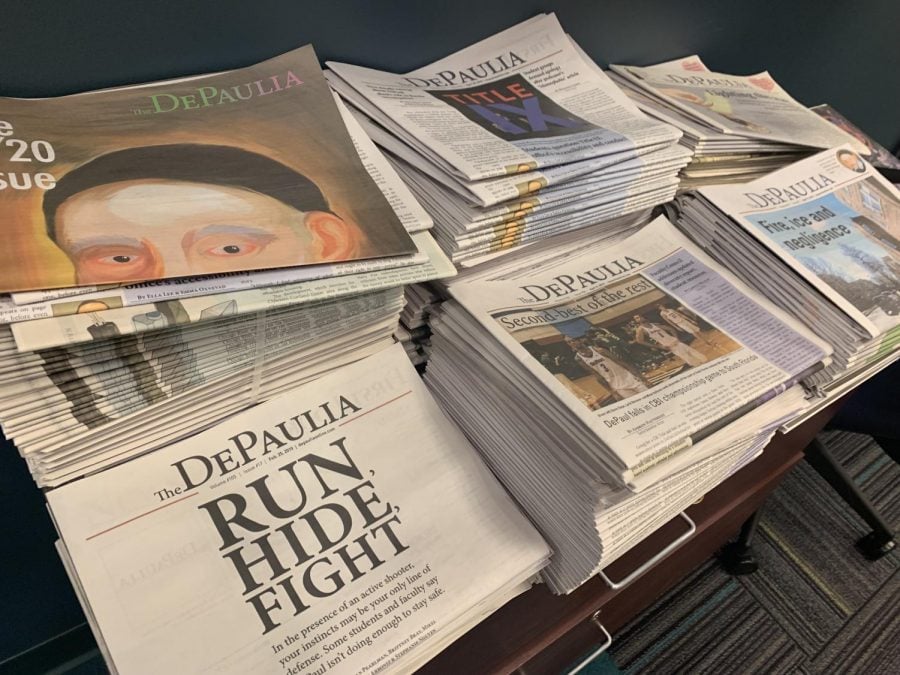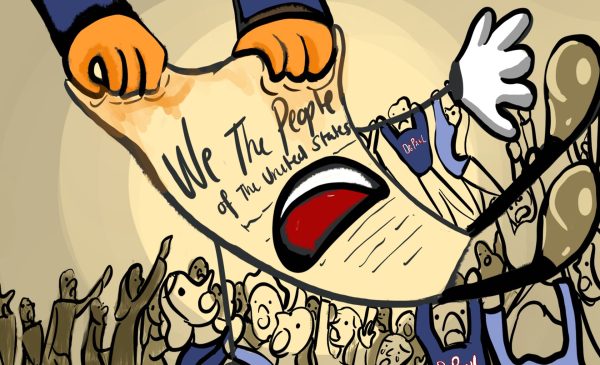EDITORIAL: During a controversial week, The DePaulia gets advice from someone who’s been there
Benjamin Conboy / The DePaulia
“Your job is not to make your readers happy,” said Dean Baquet of The New York Times. “Sometimes you will upset your readers. That’s just the way it works. Sometimes you will say things your readers will not like and you have to deal with it. You just have to own up to the fact that it comes with the job.”
You might have heard by now about the swirl of controversy that The DePaulia found itself in last week. It was a tidal wave of ethical quandaries, the likes of which we have never dealt with before.
We found ourselves accused of exploiting victims of sexual assault. We had hundreds of our newspapers stolen off of newsstands in Lincoln Park. And we got reamed out by the Title IX office for an important story we published on the front page — a story whose facts we stand behind completely.
Luckily, we had someone visit DePaul on Thursday who deals with these ethical issues every day. Issues that, if handled incorrectly, could cause markets to tumble, innocent people to be accused and even lead to the loss of human life.
Executive editor of the New York Times Dean Baquet was honored with DePaul’s Center for Journalism Excellence and Integrity Distinguished Journalist Award. As the leader of the Times’ newsroom, Baquet and his staff of reporters cover the administration of President Donald Trump, high-stakes national security issues, global war and strife, all “without fear or favor,” as the paper’s famous motto goes.
We asked Baquet what he would do if he were in our position.
“The first thing I would do is write an editorial,” he said.
Good advice.
A student was upset about how we used an image of them taken at a public event. Anytime anybody is in a public place, you are subject to being photographed, even if you don’t expressly give permission, and that photograph is legally and ethically allowed to be published. In other words, by appearing in public, you forego your right to privacy.
On top of this, there were multiple photographers at this event, announcements were made that you were subject to photography if you’re in the area and signs were posted. Everyone there knew.
But word spread around Twitter and the comments section of The DePaulia’s website, saying that we were exploiting people for our own glory, that we were insensitive and should be ashamed of ourselves.
This was neither our intention nor what we did. When we cover sensitive subjects like sexual assault, which we covered extensively in last week’s issue and in the past, we know the level of sensitivity that is required.
“If I had gotten that call, I would be empathetic, but firm,” Baquet said. “I would say, ‘I get it, I get that it’s painful. But you were in a public forum, and there’s no way we could have not covered it.’”
This is exactly the way we approached the situation. We understand the position that this student was put in, but cannot apologize for doing something that is in our job description.
Our situation was analogous to one the Times had to deal with a couple weeks ago. In a story about Sen. Bernie Sanders’ criticism of Neera Tanden, a former top aide to Hillary Clinton and the head of the Center for American Progress, a moderate liberal think-tank, the pair of reporters interviewed Tanden’s mother.
She gave unflattering quotes about her daughter, like saying that she can be “aggressive” and that she “shows up at rich people’s places because she needs funds from them.” After the article was published, Tanden’s mother put out a statement saying she didn’t know her quotes would be used in a story.
The reporters, both veteran journalists, did everything right. They identified themselves as reporters for the New York Times, at which point Tanden’s mom sounded off, letting all of her opinions fly.
It worries us how poorly students, and the general public, understand what we and other journalists are tasked with doing. We write the truth and, as the truism goes, the truth hurts.
“Your job is not to make your readers happy,” Baquet said. “Sometimes you will upset your readers. That’s just the way it works. Sometimes you will say things your readers will not like and you have to deal with it. You just have to own up to the fact that it comes with the job.”
We were also called “fake news” for very basic coverage of a professor’s controversial article published in The Federalist, which called for the annexation of the West Bank — a label The DePaulia can now proudly share with the Times.
The article was fair and balanced. It lays out both sides of the argument. We know that in today’s hyperpartisan atmosphere, giving both sides of a story can in and of itself be considered biased. But our duty as journalists is not to determine which argument is valid and which is not — it is to give you the facts and let you decide for yourself.
And whoever this student was who called the story “fake news” was probably just upset that we didn’t frame the story the way they saw it.
We do write nice and fluffy stories when they come along. But we’ll never give you something you want to hear.
“[The New York Times] gets attacked a lot from the left,” Baquet said. “We’re in a really tricky political climate where people don’t want to hear the other side.”
The issues that our editorial staff have faced this week have only emboldened us to continue reporting on these important issues. If dialogue and debate is generated by the content of the articles we publish, we can safely say that we have done our jobs.
As the old journalism cliche goes, if you’re not making someone mad, you’re not doing your job.








Michael Simmons • Apr 30, 2019 at 7:26 am
Danielle,
You have an important perspective to share and have plenty of empathy, but your point is diminished when you a) use sarcasm (“gold star”) b) personally insult someone (“mediocre newspaper”). And c) Use all caps.
Danielle Hurley • Apr 29, 2019 at 8:29 pm
How demoralizing can you be? Yes, you technically can be photographed at a public event without giving prior consent. Cool, fine. The lack of sensitivity, courtesy and just plain respect you showed by publishing the photograph is ASTOUNDING. You went to a DePaul sponsored event, fine. You took some photographs, fine. You published it, great. But that’s not the whole story and you know it. You went to an event for sexual assault survivors, you took a photograph of an emotional moment where a survival retold her trauma, potentially for the first time, trusting the crowd to understand them. The student obviously went to DePaul, if you had an ounce of the integrity, you could have found their name with ease. But, you didn’t. You published it without talking to the student at all. ON TOP OF THAT, you plastered it on the front page, stealing that students moment and making them a symbol for your mediocre publication for clout. So yeah, you didn’t do anything illegal. Go get your gold star. Meanwhile, you betrayed the trust of so many students and completely disrespected the student in the picture. I hope it was worth it.
CM • Apr 29, 2019 at 1:06 pm
Congrats on shaming that student who didn’t want their photo used even further in this piece. You don’t know their life and the circumstances of that evening. There was no need to call them out further like this. Absolutely awful.
D.M. • Apr 29, 2019 at 7:46 am
Making people at fault uncomfortable is a consequence of good journalism.
Whether it’s shedding light on dysfunction and abuse within a department at DePaul or demonstrating the absurdity of executive salaries in the face of layoffs, you’re doing your job. A job well done.
Kam Olson • Apr 29, 2019 at 6:22 am
Well said. Well done.
I expect a respectful response from the Title IV Office. Being “reamed out” is not appropriate reaction to criticism.